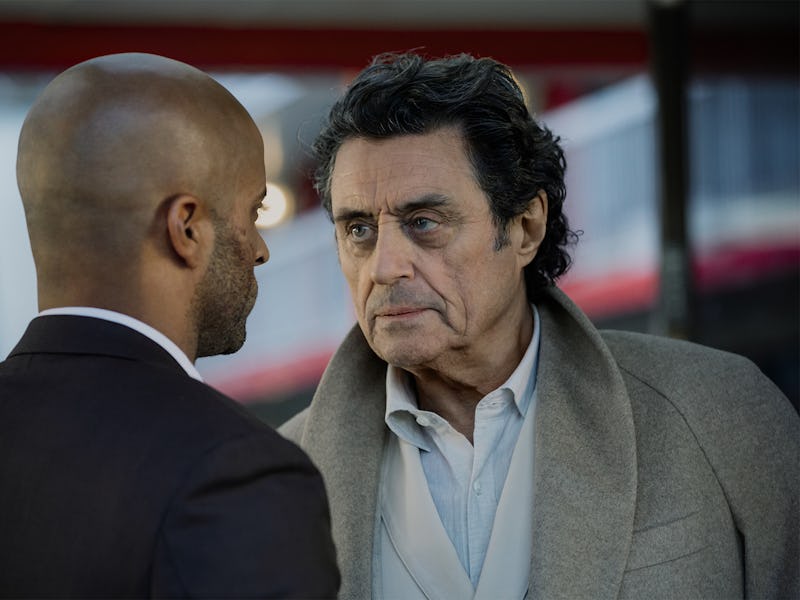Why Mr. Wednesday Is the Most Sinister American God
Everything you need to know about Ian McShane's wily con man.

The world of American Gods is one in which myths are real and gods live among us, working as taxi drivers and hustlers, funeral parlor owners, and bar brawling drunk dudes. Both Neil Gaiman’s iconic novel and Bryan Fuller and Michael Green’s television show are brimming with strange characters — but nobody steals a scene more often than Ian McShane’s Wednesday.
On a simple surface level, Wednesday is a con man, a hustler, and a trickster. He’s charming and jovial with a razor sharp wit. As the story begins, after conning his way into a first class seat on an airplane, he offers the ex-con Shadow (played by Ricky Whittle) a job. He’s quite literally the engine that drives the story’s plot. After a “chance” meeting on that airplane, he implores Shadow to be his bodyguard, his right hand man, and his driver.
Wednesday tells Shadow that working for him essentially involves running errands. “In an emergency, but only in an emergency, you hurt people who need to be hurt,” he adds. “In the unlikely event of my death, you will hold my vigil. And in return, I shall make sure that your needs are adequately taken care of.”
Wednesday’s mission is deliberately left vague. Shadow and the audience both follow him on an odyssey across America, featuring roadside attractions like The House on the Rock and visits with his idiosyncratic friends, slowly learning what he’s up to. So far, this is all fairly normal — while Wednesday is intriguing, a charming con man on a road trip is hardly a pop culture anomaly.
But Wednesday isn’t just a con man. He’s also Odin, the old Nordic deity associated with wisdom, though he usually harbors a disregard for law and convention. He’s often associated with war or poetry, and with magic, the dead, and outlaws. He has ravens and wolves, and he rules over Valhalla. Of course, if you watch Marvel’s Thor movies, he’s also associated with capes, eye-patches, and Anthony Hopkins.
When Wednesday reveals his identity to Shadow in the sixth chapter of the novel, he says,
I told you I would tell you my names. This is what they call me. I am called Glad-of-War, Grim, Raider, and Third. I am One-Eyed. I am called Highest, and True-Guesser. I am Grimnir, and I am the Hooded One. I am All-Father, and I am Gondlir Wand-Bearer. I have as many names as there are winds, as many titles as there are ways to die. My ravens are Huginn and Muninn, Thought and Memory; my wolves are Freki and Geri; my horse is the gallows.
As the most powerful god in the Nordic pantheon, he’s the leader of the Old Gods in America. His mission in American Gods is to recruit fellow “forgotten” gods for a war against American’s newer forms of worship, like media.
Stop reading here if you don’t want spoilers on the end of the story.
Still here? As it turns out, Wednesday’s grand plan is even more sinister than a simple war. Towards the end of the novel, it’s revealed that this entire war is a two-man con between Wednesday and Loki. The war would invigorate Wednesday’s power, while the battle chaos would fuel Loki. It’s also revealed that Wednesday is actually Shadow’s father and that Shadow’s very birth was orchestrated as part of this grand plan.
Wednesday isn’t just a hustler in his schemes throughout the plot — the entire story of American Gods is one big con he orchestrates with a wildly smile.
American Gods premieres April 30 on Starz.